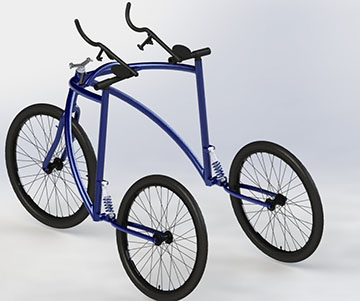NIH STTR Award To Fund Design, Safety and Usability Testing of Three-Wheeled Mobility and Fitness Device (ME UCEDD)
November 2, 2015

|
The R.M. Beaumont Corporation of Brunswick, ME and three University of Maine researchers are collaborating on a $225K National Institutes of Health (NIH) Phase 1 Small Business Technology Transfer (STTR) grant to complete the design, safety and usability testing of AFARITM, a three-wheeled, aesthetically designed, adaptive mobility and fitness device.
Elizabeth DePoy, Ph.D., and Stephen F. Gilson, Ph.D., professors of interdisciplinary disability studies at the University of Maine Center for Community Inclusion and Disability Studies (ME UCEDD), are the original inventors of AFARITM. Vince Caccese, Ph.D., UMaine professor of mechanical engineering, is the third inventor and also serves as co-principal investigator on the project. Over the one-year grant period, DePoy, Gilson and Caccese will research the major barriers to timely commercialization of AFARITM so that they can be eliminated.
AFARITM is designed to facilitate movement for individuals who have balance deficits, a fear of falling, and/or a condition such as osteoarthritis that is eased by unloading body weight, so they may participate in upright outdoor walking, jogging, or running on diverse terrain.
"Osteoarthritis has been diagnosed in over 15% of the US population and is the primary cause of musculoskeletal lower extremity disability," notes DePoy. "Unfortunately there is no cure of osteoarthritis and ultimately, many patients resort to invasive joint replacement surgeries due to pain and decreased mobility. Current research indicates that exercise remains the core treatment to manage osteoarthritis regardless of age, comorbidity, pain, severity or disability."
For more information about AFARITM, please visit the Mobility Technologies website.







